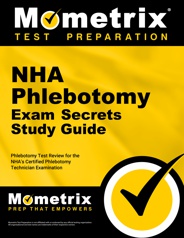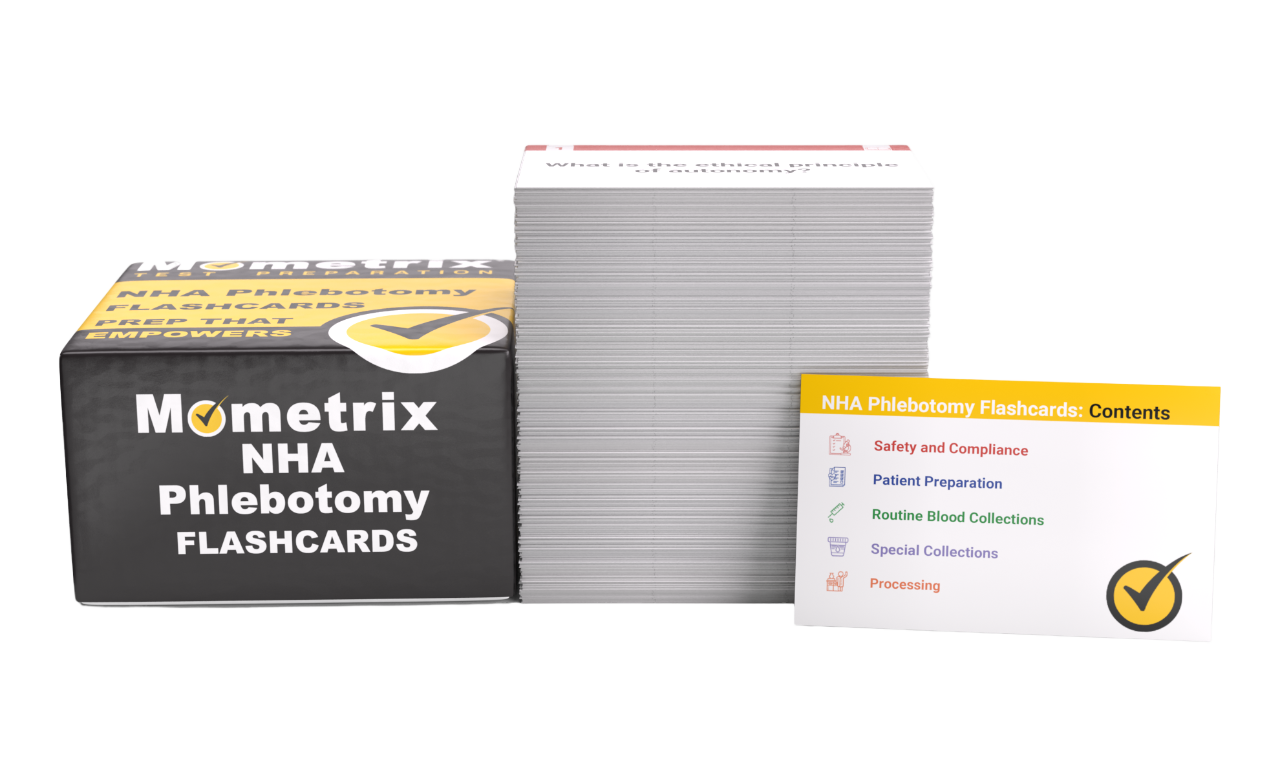If you are considering a fascinating career as a certified phlebotomy technician, this review is designed to help you learn what you need to know to be prepared for the certification examination.
Click “Start Test” above to take a free CPT practice test, and check out our premium-quality CPT test prep resources by clicking the links below!
What is the NHA CPT Exam?
The CPT exam is the certification exam developed by the National Healthcare Association to determine the skill levels and knowledge of applicants desiring to become certified phlebotomy technicians.
Phlebotomy technicians are essential parts of the healthcare system, needed in clinics, doctor offices, hospitals, and laboratories all across the country. These professionals draw blood and prepare the blood so the tests that doctors have ordered can be run.
According to research done by the Bureau of Labor and Statistics, the demand for certified phlebotomy technicians will increase by as much as 22% over the next 8-10 years.
Check Out Mometrix's NHA Phlebotomy Study Guide
Get practice questions, video tutorials, and detailed study lessons
Get Your Study Guide
Requirements Before Taking the Exam
In order to register for the CPT examination, you have to meet the eligibility requirements.
Education Requirements
Each applicant is required to have a high school diploma or a GED certificate.
Training Program or Work Experience Requirements
Each applicant must complete a training program from an accredited or state-approved learning institution.
Applicants who received formal medical services training in the health field while training or serving in any branch of the military meet the educational training requirements as long as their training was completed within the last five years. Training received through the military will require relevant work experience in conjunction with the training.
Work experience will include a minimum of one year of experience working in a health services field approved by the NHA. This period of hands-on work experience has to have been completed within the last three years.
Evidence of Skills
During your certified training course, or through your work experience, you will have to have completed a minimum of 30 successful venipunctures and 10 successful capillary sticks.
The blood draws will have to have been performed on live persons, and you will need to provide evidence of the punctures and sticks.
Certified Phlebotomy Technician Exam Outline
The CPT test is divided into five sections. You will need to have core knowledge that may be used in any portion or section of the test to assess your basic knowledge, including:
- The role of a CPT in laboratory testing situations
- The role a phlebotomist plays in patient care
- Medical terminology a phlebotomist must be familiar with
- Aseptic techniques
- The components of blood, such as serum, plasma, whole blood, etc.
- The blood grouping systems
- Anatomy and physiology of the heart and pulmonary system
- Vascular anatomy that is phlebotomy related, such as hand, foot, or antecubital fossa
- Hemostasis and the process of coagulation
- How pre-analytical errors affect test results
- Needlestick safety and prevention
- Documentation and reporting
- Verbal communication
- Non-verbal communication
- Patient characteristics that might affect communication
- Professionalism
- NHA code of ethics
Questions in each section will assess the knowledge, information, and concepts a phlebotomist must know, as well as tasks or duties that a phlebotomist must be able to perform.
I. Safety and Compliance
The Safety and Compliance section of the CPT exam focuses on the various hazards of working with blood specimens and how to be in compliance with safety regulations. Here’s a look at the details you’ll be asked about in this section:
- Adherence to regulations such as OSHA, HIPPA, operational standards, ethical standards
- Quality control
- Sharps disposal
- PPE
- Hand hygiene
- Infection control
- Exposure control
II. Patient Preparation
The Patient Preparation section of the CPT exam focuses on introducing yourself to the patient, explaining procedures, determining the best collection site, and verifying patient compliance. Here’s a closer look at the details of this section:
- Interaction with patient
- Receiving consent
- Identifying special considerations
- Determining collection site
- Instructions to patients performing non-blood specimens
- Timing requirements
III. Routine Blood Collections
The Routine Blood Collections section of the CPT exam focuses on day-to-day tasks, labeling specimens, post-procedure patient care, tourniquet application, and order of draw on a venipuncture. Here’s a look at the details of this section:
- Equipment assembly
- Following order of draw on venipuncture
- Applying antiseptic agent
- Labeling
- Post-procedure care
IV. Special Collections
The Special Collections section of the CPT exam focuses on atypical blood collections, peripheral blood smears, blood culture collections, and collections for blood donations. Here’s a closer look at what this section of the test pertains to:
- Non-blood specimen
- Skin preparation
- Volume requirements
V. Processing
The Processing section of the CPT exam focuses on the guidelines and procedures used after the specimen is obtained. Specifically, these are the main points that this section will cover:
- Chain of custody guidelines
- Handling, storage, and disposal of specimens
- Centrifugal techniques
- Input and retrieval of specimen data in the information system
Retaking the Certified Phlebotomy Technician Exam
First Retake
If you do not have a passing grade after the first attempt, you will need to wait thirty days before you will be eligible to retake the test.
Second Retake
If you do not have a passing grade after the second attempt, you will need to wait an additional thirty days before you will be eligible to retake the exam a second time.
Third Retake
If you do not have a passing grade after the third attempt, you will need to wait twelve months before you will be eligible to retake the exam a fourth time.
Fourth Retake
After the fourth attempt at taking the exam, you will have a mandatory waiting time of twelve months before you can apply to take the test again.
Check Out Mometrix's NHA Phlebotomy Flashcards
Get complex subjects broken down into easily understandable concepts
Get Your Flashcards
How to Register for the CPT Exam

To register for the exam, visit the National Health Association’s website. At the top of the landing page, on the right-hand side, you will see an orange button that allows you to either log in to an existing account or create a new account.
When you create the account, you will provide your first and last name, email address, and mobile phone number. Additional information like your mailing address will also be required. When you are ready to register for the test, you simply log into your NHA account and follow the onscreen prompts.
Remember your login information; when you are ready to see your test scores, you will need to log into your account again.
What to Bring on Test Day
Taking the Online Test at Educational Institution
You will need a current government-issued identification card or driver’s license with your photo. The name on your identification must be an exact match to the name you are registered under for the test.
Taking the Paper-and-pencil Test at Educational Institution
You will need a current government-issued identification card or driver’s license with your photo. You will also need to bring two number-2 pencils that are sharpened and ready to use.
Taking the Test at a PSI Testing Center
When you register for the exam, you will be allowed to choose at which approved location you will be taking the test. All locations will require a government-issued photo ID for verification before you begin the test.
FAQs
Q
What is the time limit for the CPT exam?
A
There is a two-hour time limit to complete the CPT test.
Q
How much does the CPT exam cost?
A
The cost of the test is $117, which is non-refundable unless the exam you are scheduled to take is canceled by NHA.
Q
What is considered a passing score?
A
A score of 390 or higher is required to pass the CPT exam.
Q
When will I know what I scored on the test?
A
Within 48 hours, your CPT exam scores will be posted on your NHA account page. You will be notified by email that your test scores are ready to view.
Q
How long will the certification be good for?
A
You will need to renew your certification every two years. You will have one year from the date your certification expires to reinstate it.

